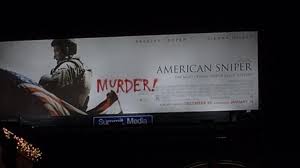Clint Eastwood’s American Sniper earned over $100 million in its opening weekend, making it the biggest hit of Eastwood’s storied career. People flocked to see this movie, many driven by the bitter controversy the war movie has stirred up. While some object to the movie as a glorification of both violence and an unjust war, just as many seem to praise the film’s treatment of a heroic man under extremely challenging circumstances. I saw the movie, enjoyed it, and felt it navigated the subject matter’s difficulties and emotional ambiguities quite deftly. The extreme reactions some people are having to the movie are projections of their own frustration or viewpoints. American Sniper has become an archetypal battlefield.
Archetypes are the largely unconscious patterns or forms that we adopt to give our lives context and meaning. These archetypes are narratives that allow us to put our interactions into a recognizable and even predictable framework—knowing the story we are watching or connected to allows us to make assumptions, predict next moves and understand the cast of players around us at any given time.
American Sniper is rooted in three archetypes—the Warrior, the Caregiver and the Destroyer. And while the movie deals with destruction and caregiving cleverly and I think sensitively, these are two archetypes not often seen side-by-side, and the juxtaposition has triggered this latest cultural rift.
- Warrior—this is the story of competition, struggle and toil. A Warrior’s story is a tale of someone marshaling strength to meet a challenge or best an enemy.
 Caregiver—this is the story of care and concern. A Caregiver’s story has someone working and sacrificing for the care and protection of others.
Caregiver—this is the story of care and concern. A Caregiver’s story has someone working and sacrificing for the care and protection of others.
 Destroyer—this is the story of termination and destruction. A Destroyer’s story is about endings—from the mundane to the violent.
Destroyer—this is the story of termination and destruction. A Destroyer’s story is about endings—from the mundane to the violent.
Clearly, American Sniper is a Warrior narrative—the largely true story of a Navy Seal in the Iraq War must be at its root a story of challenge, strength and battle. What is interesting—and at the source of the controversy—is the movie beneath the war story. American Sniper’s protagonist, Chris Kyle (played by Bradley Cooper) is portrayed as a man with a simple and focusing code that he never loses sight of. He believes strength should be used to protect those in his care. He learns early in life that the world is full of sheep and wolves, but that there are also sheepdogs, whose job it is to protect the weak from bullies. Kyle decides his job is to be a sheepdog, and thus the Caregiver story is in place, and it never wavers. Any moral doubt or complexity the war and its larger mission may present fade into obscurity in light of the Caregiver’s crystal-clear mission—protect the sheep in my care. Chris Kyle is a warrior, but American Sniper is just as much a Caregiver narrative.
War is destruction, and the Iraq War brought with it the violent end of many things—civil order, cities, families and people by the hundreds of thousands. American Sniper gives us a front row seat for the death of men, women and children—we graphically see the destruction that soldiers bring down on each other and the civilians who surround them. But we also see the destruction of certainty and the clarity of goal and purpose. While Chris Kyle never questions his code or focus, the movie certainly does through its slow build of nauseating violence and a surrounding cast filled with doubt and disillusionment. The growing destruction culminates in a rooftop battle overtaken by a ferocious sand storm that comes to obscure everyone and everything. While this movie is not about WMD or any false pretenses that got us into the war, it does a powerful job showcasing the war’s waste, brutality and futility. American Sniper is a Destroyer narrative.
The controversy surrounding American Sniper, of course, has as much to do with the active archetypes of the viewers than anything happening on the movie screen. To someone who sees the Iraq War as a positive or necessary thing and those who fought it, heroes and heroines—or to someone who looks past the larger questions of the war’s justification to see the story of this one soldier, the presentation of American Sniper’s main character as a Warrior/Caregiver is just and praiseworthy. The destruction wreaked was justified by the noble mission of care at the story’s core.
However, to those who see the war as wrong, or perhaps even the evil offspring of a government’s lie or bitter mistake—to those who cannot see the Iraq War in anything but Destroyer terms, see the Caregiver themes within American Sniper as a Hollywood ploy to over-simplify and sentimentalize a vile and shameful chapter in American history. To these viewers, the deadly sniper with a heart of gold story denies the full horror of the war’s destructive effect on not just Iraq but on America’s culture. From the Destroyer’s perspective, the Caregiver story is trivial and even offensive.
It is your archetypal energy as the viewer every bit as much as the literal story unfolding on the screen that will determine your connection of American Sniper. The lines seem to be drawn, and the verbal weapons are flying in our latest archetypal battlefield.
Click here to learn more about the archetypes or OKA’s Narrative Intelligence training.


Excellent! I love your analysis, Hile!